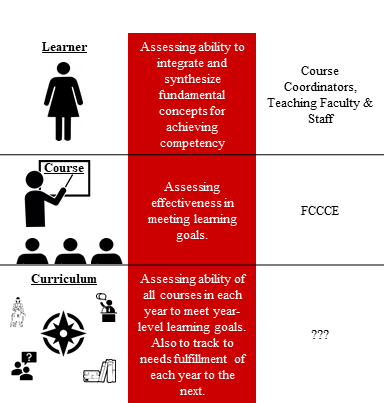Assessment
Valid assessments will be driven by learning goals at the learner, course, and curriculum levels. Assessments should be appropriately rigorous and based on established standards for performance. Furthermore, consistency in assessment methods within and between courses facilitates student integration of material and is thus recommended wherever possible. Support for remediation will be included at all levels where possible, and aligns with both competency-based design and cultivation of professional dispositions.
Assessment at any level should be designed around learning goal appropriate Criteria, and support competency development by working within framework such as EPAs and Milestones.

Learner Level Assessment
The assessment strategy at this level gauges individual student competence with core and specific content. It should include three types of assessment and assess three aspects of these competencies. Achievement of appropriate professional dispositions must also be considered at the level of the individual.
Types of Assessment
– Formative assessments: Regular, individually low grade-point value, measures of skill / comprehension that inform student and teacher choices for further study and instruction
– Summative assessments: Semi-regular, mid grade-point value, measures of skill / comprehension achievement within a course
– Capstone assessments: End of semester or year, mid or high grade-point value, measures of skill / comprehension achievement that integrate content from all courses within the target time period
Aspects of Competency
– Fundamentals – The basic concepts and skills on which any content is built
– Integration – Making connections across different content within and between courses
– Synthesis – Combining skills and knowledge from many sources to complete complex tasks
Course Level Assessment
The assessment strategy at this level gauges the effectiveness of a given course in meeting its learning goals. Assessments should be performed by the FCCCE or a similar organization of faculty peers, and review multiple sources of evidence, including aggregated learner-level assessment results.
Curriculum Level Assessment
Assessment strategy at this level gauges the effectiveness of the combined courses within a given year in meeting the learning goals of that year, as well as the ability of each curricular year to prepare students for the next. Capstone assessments for each year may also be considered curriculum level assessments. Finally, it is at this level of assessment that we consider the shifting needs of the profession and recommend appropriate changes to the learning goals of the curriculum. These changes will require systematic adjustment of learning goals for curricular years and the courses within them. Capstone assessments provide a valuable tool for outlining and adapting the content requirements of each year.
Discussion Point: Do we need another “Curriculum Committee”?
The Steering Committee recommendations include an increased workload for the current FCCCE that could prove problematic in consideration of their already full docket. To this end, we recommend a new committee be formed for overseeing curricular level assessment and planning. This committee would need to represent each focus area and year. At conception, it is vital that this committee negotiate responsibility areas and intersections with the FCCCE.
The decision to create a new committee or not will be made during Stage 2 and involve in-depth discussions with many stakeholders, most certainly including the FCCCE.
